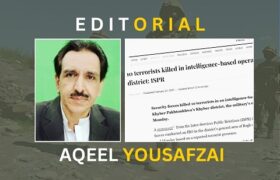Amna Noreen
Afghanistan holds a significant place in Pakistan’s foreign policy in context of peace and stability, trade, people-to-people contacts, and regional connectivity. Pakistan’s foreign policy is based on non-interference which is a vital component of our vision of a “peaceful neighbourhood.”
Since last 50 years, Pakistan has been trying its best to forge deep-rooted friendly ties with Afghanistan because both counties are bound together through cultural, religious, and economic realities. When USSR occupied Afghanistan in 1979, it was Pakistan that provided shelter to more than five million refugees at one time and still 3.5 million Afghani citizens are part of Pakistani society. Pakistan is working with Afghanistan and international organization i.e. UNHCR and IOM for their safe, dignified, sustainable and voluntary return to their homeland under various UN strategies (SSAR).
Pakistan has always extended a helping hand to Afghan brethren despite historic diplomatic rift between the two counties dating back to Kabul’s decision to not to recognize Pakistan as sovereign state in 1947.
After 9/11, Pakistan once again assumed the role of developing partner of Afghanistan to rebuild the war-torn nation.
In pursuance of this policy, Islamabad became part of all international forums geared towards bringing peace, stability and development in Afghanistan.
Pakistan participated in meetings of Kabul process I and II. It attended RECCA, Moscow Format on Afghanistan, SCO Contract Group on Afghanistan, International Contract Group on Afghanistan, 6-Party Talks and Doha Peace process which eventually led to evacuation of foreign forces from Afghanistan.
Apart from these global initiatives, Pakistan took initiative and started many social, socio-economic projects in Afghanistan. Below is a brief snapshot of Pakistan’s contribution in Afghanistan’s development and prosperity.
Education and Training:
- Rahman Baba School, Kabul.
- Rahman Baba Hostel, Kabul.
- Allama Iqbal Faculty of Humanities, Kabul University.
- Sir Syed Post Graduate Faculty of Sciences, Nangarhar University.
- Liaqat Ali Khan Engineering Faculty, Balkh University.
- Six Primary Schools in various provinces.
- Two Vocational Training Institutes in Kabul city and Baghlan.
- 2×200 KVA Generator for Kabul University.
- 10 Buses for Kabul and Nangarhar Universities.
- 5 million Religious Text Books of Grade One to Grade Ten.
- 300,000 School Kits for 18 provinces.
- 3000 School Bags for Kabul, Jalalabad and Kandahar.
- 6000 Afghans Studying in Universities and Colleges in Pakistan.
- 500,000 Refugee Students enrolled in Schools in Pakistan.
- 2000 Fully Funded Scholarships for Higher Education in Pakistan.
- Trained 644 Afghan Police and Drug Control Officers, Doctors and Paramedical Staff, Diplomats, Judicial Officers, Customs Officers, Agriculturists and Bankers.
Healthcare:
- Nishtar Kidney Centre, Jalalabad.
- Four Hundred Bed Jinnah Hospital, Kabul.
- Naeb Aminullah Khan Hospital, Logar.
- 45 Ambulances for 12 Provinces.
- 14 Fully Equipped Mobile Medical Units.
- Medicines for Kabul, Jalalabad and Kandahar.
- A Week-Long Free Eye Camp in Jalalabad treated 4818 patients, Performed 357 Eye Surgeries and Distributed 4126 Eye Glasses.
- A single philanthropic Pakistani organization performed over 30,000 free eye surgeries on Afghan patients in 2008 alone.
Roads & Transport:
- 75 KM Torkham –Jalalabad Road.
- Additional Carriage Wayat Torkham –Jalalabad Road.
- 3 Internal Roads in Jalalabad.
- Rail Link to connect Chaman and Kandahar (Proposal under construction).
Traffic Signals in Jalalabad city.
- Provision of Road Construction Machinery.
- 30 Mobile Hot Mixers.
- 200 Trucks.
- 100 Public Transport Buses.
- 2 Pickups, 4 Generators and Medicines for Wardak Province.
General Assistance:
- Television Transmitters for Kandahar.
- Digital Radio Link between Kabul and Peshawar.
- 28 Generators to Various Provinces.
- Security Equipment.
- 500 Computers for Different Provinces.
- Installed 15 deep well hand pumps in villages of Kabul.Rehabilitated Kabul Zoo and Deh Mazang Park.
- 50,000 Food Packages during the Month of Ramadan.
- 50,000 Metric Ton Wheat.
- 9600 Tents for the Internally Displaced People.
- 100 Afghans Assisted to Perform Hajj.
Trade between Pakistan & Afghanistan:
Pakistan is Afghanistan’s largest trade partner.
Historically both the countries have had good trade relations. According to Afghanistan Central Statics Organization (CSO), Ministry of Finance, during Afghanistan’sFY 2018, bilateral trade remained the highest and reached US$ 1,437 million followed by Afghanistan- Iran at US$ 1,284 million.
Pakistan Exports to Afghanistan was $833.42 Million during 2021, according to the United Nations COMTRADE database on international trade.
Meanwhile imports from Afghanistan, have increased to more than $700 million.
The two sides have the following institutional mechanisms in the domain of trade and economic cooperation:
- Afghanistan Pakistan Transit Trade Cooperation Authority (APTTCA).
- Pak-Afghan Joint Chamber of Commerce & Industry.
- Pakistan-Afghanistan Joint Business Council.
- Joint Economic Commission (JEC).
- Afghan-Pakistan Action Plan for Peace and Solidarity (APAPPS).
- Pakistani government has identified 44 places on the border where it plans to establish new crossings to further facilitate commercial activities as well as visitor movement.
Total Pakistani investment, since 2001, has crossed 1 billion USD. Pakistan, despite facing severe economic challenges, made these contributions to turn Afghanistan a peaceful and sustainable state. Pakistan wants Afghan refugees to go back to their homeland but not in a war-torn and deserted Afghanistan rather a peaceful Afghanistan where institutions would function properly to cater the needs of common Afghan citizen. Pakistan’s investment in Afghanistan and overall role for Afghan stabilization must be propagated across the world as Pakistan was taking these actions when the entire world abandoned Afghanistan despite making massive promises of national building process. For example, when we juxtapose Pakistan’s role in Afghan development with that of Indian role in Afghanistan, a significant difference both in performance and intent becomes crystal clear.Indian claim of 3 billion USD investment in Afghanistan has nothing to showcase except a dam on River Kabul.
Pakistan and Afghanistan are two inseparable twins joined by historic, cultural, religious, and strategic ties. Pakistan believe in a peaceful Afghanistan as its own strategic interests are linked with peaceful Afghanistan like establishing a land-bridge to Central Asian ‘states’. A restive Pakistan-Afghanistan border will create new challenges for Pakistan’s own security. Pakistan will continue to play the role of harbinger of development and prosperity in Afghanistan despite all odds like it has so far. In Sha Allah!




